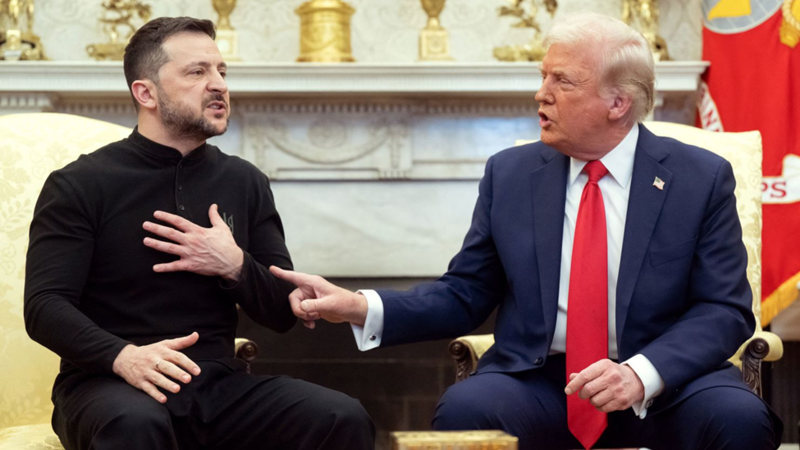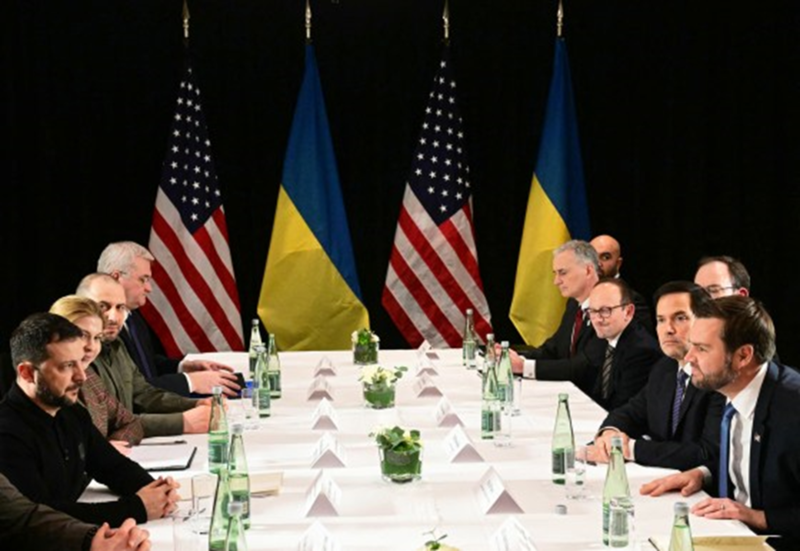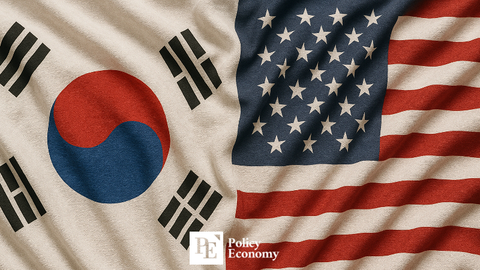The Strategic Shift: In Response to Diplomatic Tensions, the United States Suspends Military Aid to Ukraine
Input
Changed
The Reversal of Policy and Diplomatic Conflict Security and Strategic Consequences The Future of Global Diplomacy and U.S.-Ukraine Relations

The Reversal of Policy and Diplomatic Conflict
The U.S. decision to suspend military aid to Ukraine following a tense meeting between Presidents Trump and Zelensky has raised concerns about global security, European stability, and the future of Western alliances. While the Trump administration frames the move as a strategic reassessment of foreign aid, critics warn that it may embolden Russia, weaken Ukraine’s defense, and challenge NATO’s credibility in maintaining international security.
The international community has been left in a state of astonishment by the United States' decision to suspend military aid to Ukraine, which has raised concerns about the future of the war-torn nation and the unity of Western allies. The decision was made in response to a contentious exchange between U.S. President Donald Trump and Ukrainian President Volodymyr Zelensky. During the exchange, Trump accused Ukraine of neglecting to express adequate gratitude for American support and of not taking decisive action in the context of peace negotiations with Russia.
The implications for global security, U.S. foreign policy objectives, and the broader geopolitical landscape have been the subject of debate as a result of this precipitous policy shift. Although Trump's administration maintains that the decision is consistent with America's strategic interests, critics are concerned that it could potentially undermine Ukraine's defense capabilities and embolden Russia. The move also raises broader concerns about the commitments of NATO allies, the role of America in global security, and the potential for U.S. foreign policy to shift toward other global priorities.
Following a White House meeting between President Trump and President Zelensky, tensions between Washington and Kyiv reached a critical point. The meeting was attended by sources who reported that Trump was visibly frustrated by Zelensky's persistent requests for additional military aid. President Trump, who has consistently advocated for the reevaluation of U.S. foreign aid programs, is reported to have expressed apprehensions regarding Ukraine's reliance on American assistance without demonstrating a sufficient commitment to a diplomatic resolution with Russia.
The Ukrainian delegation was abruptly dismissed at the conclusion of the meeting, and a jointly scheduled press conference was canceled. Trump's announcement of a temporary cessation of military aid to Ukraine was a significant departure from the previous U.S. policy, which had allocated billions of dollars to Ukraine's defense since Russia's full-scale invasion in 2022. This announcement was made shortly thereafter. The pause in aid is consistent with Trump's overarching strategy of reevaluating foreign aid commitments. This strategy includes a recent 90-day moratorium on a variety of U.S. aid programs, with the exception of those for Israel and Egypt.
European allies urged for diplomatic restraint, and international leaders responded promptly to the development. The necessity of ongoing Western assistance to Ukraine was underscored by French President Emmanuel Macron, who urged for tranquility. British Prime Minister Keir Starmer took a step further by proposing the establishment of a "coalition of the willing," in which European nations would increase their military and economic assistance to Ukraine independently of the United States.
The diplomatic response underscores the increasing apprehension that the pivot away from Ukraine by the United States could disrupt the balance of power in Europe and change the course of the conflict. Trump's decision has prompted many to query whether Europe must now assume a greater share of the responsibility, as European nations have historically relied on the U.S. as the foundation of NATO's defense strategy. Policymakers in Germany are contemplating a substantial increase in defense expenditure to address potential deficiencies that may arise as a result of diminished U.S. involvement.
In addition to complicating matters, Russia has expressed its approval of the decision, with Kremlin officials claiming that it demonstrates a "more pragmatic" approach to global diplomacy. Nevertheless, security analysts caution that Moscow may interpret this as an indication of decreasing Western resolve, which could potentially lead to additional aggression in Ukraine or toward other former Soviet states.

Security and Strategic Consequences
The future of Ukraine's defense capabilities is at stake due to the suspension of aid. The United States has been Ukraine's primary supporter, providing the country with the necessary financial assistance, training, and advanced armaments to withstand Russian military aggression. Ukraine's capacity to maintain its military operations could be considerably impacted by the abrupt cessation of assistance, particularly in light of the ongoing territorial advances and missile strikes initiated by Russian forces.
The immediate disruption in supply chains for critical munitions and defense equipment is a significant concern for Ukrainian military officials. In order to preserve its front lines, Ukraine's military extensively depends on armored vehicles, advanced reconnaissance technology, and Patriot missile systems supplied by the United States. If aid is suspended for an extended period, it could erode Ukraine's defenses, necessitating a retreat from critical territories and resulting in strategic losses that may be challenging to recover from.
The decision has long-term geopolitical implications in addition to its imminent military implications. The security of Ukraine is inextricably linked to the stability of the broader European region. A decrease in U.S. support may serve to incite Russian aggression, potentially enabling Moscow to expand its influence into Ukrainian territory. Critics of Trump's decision contend that a weakened Ukraine could jeopardize the security of NATO's eastern flank, thereby escalating the likelihood of a broader regional conflict.
Simultaneously, the Trump administration maintains that the suspension does not constitute a permanent cessation of U.S. assistance. Instead, officials characterize it as a component of a more comprehensive approach to motivate European nations to assume a more significant role in regional security matters. Some policymakers in Washington contend that the reallocation of resources to confront emerging threats elsewhere, such as strengthening alliances in Latin America, could be facilitated by the shift in U.S. foreign policy focus.
The decision has incited a ferocious debate on Capitol Hill in the United States. Lawmakers from both political parties are evaluating whether the reduction of support to Ukraine is consistent with the overarching strategic objectives of the United States. Some contend that ongoing assistance is crucial for the preservation of American influence and the prevention of Russian expansionism, while others advocate for European nations to assume a more prominent role in providing support to Kyiv.
Additionally, there is apprehension regarding NATO's credibility in a more general sense. If it appears that America's commitment to Ukraine is in doubt, it could send a message to other U.S. allies that American security guarantees are not unbreakable. This could have long-term repercussions for U.S. alliances in the Indo-Pacific region, where nations such as South Korea and Taiwan closely monitor U.S. commitments to its international partners. Concerns regarding Washington's commitment to defending its allies in other volatile regions may be exacerbated by a perceived withdrawal of U.S. support from Ukraine.

The Future of Global Diplomacy and U.S.-Ukraine Relations
Although the suspension of aid represents a substantial change in U.S. policy, it does not inherently indicate a complete severance of relations between Washington and Kyiv.. Some officials have suggested that assistance could resume if Ukraine demonstrates progress toward diplomatic engagement with Russia, and the Trump administration has left the door open for a reassessment of aid policies.
Nevertheless, this posture has been met with skepticism in diplomatic circles. Ukrainian officials contend that negotiations with Moscow are still fraught with obstacles, as Russia has demonstrated a lack of willingness to participate in sincere peace negotiations. Furthermore, numerous European leaders are concerned that the reduction of military assistance could leave Ukraine vulnerable at a critical juncture, potentially exacerbating human suffering and prolonging the conflict.
Additionally, there are more extensive inquiries regarding the destiny of transatlantic relations. Efforts to establish an autonomous defense framework within the European Union may be expedited if the United States persists in its disengagement from the European security landscape. The discussion of a potential European army, which is being led by France and Germany, is already gathering momentum as European leaders contemplate long-term strategies for self-reliance in defense matters.
Additionally, Trump's decision may have political ramifications on a domestic scale. Foreign policy has emerged as a critical campaign issue as the 2024 U.S. presidential election approaches. There is a continuing divide in public opinion regarding Ukraine, with some Americans advocating for the continuation of assistance, while others are skeptical of the financial implications of overseas military obligations. The global impact of this decision has the potential to influence voter sentiment and influence the foreign policy agenda of the upcoming administration.
The world is intently monitoring the situation as it develops. This policy shift will determine whether it is a temporary recalibration or a more permanent change in the trajectory of U.S. foreign policy in the upcoming weeks and months. The decision to suspend military aid to Ukraine is a defining moment in international relations, with significant implications for the future of Western alliances and global stability, irrespective of the outcome.





















